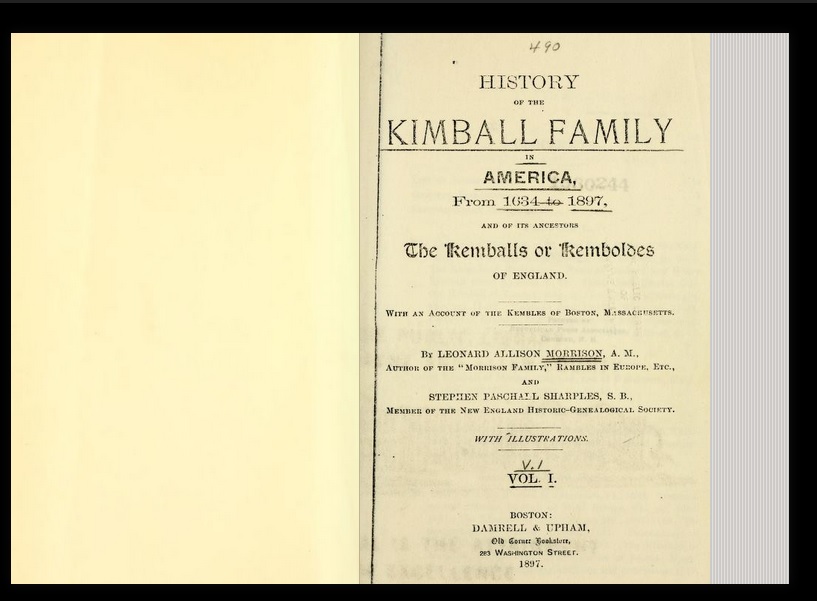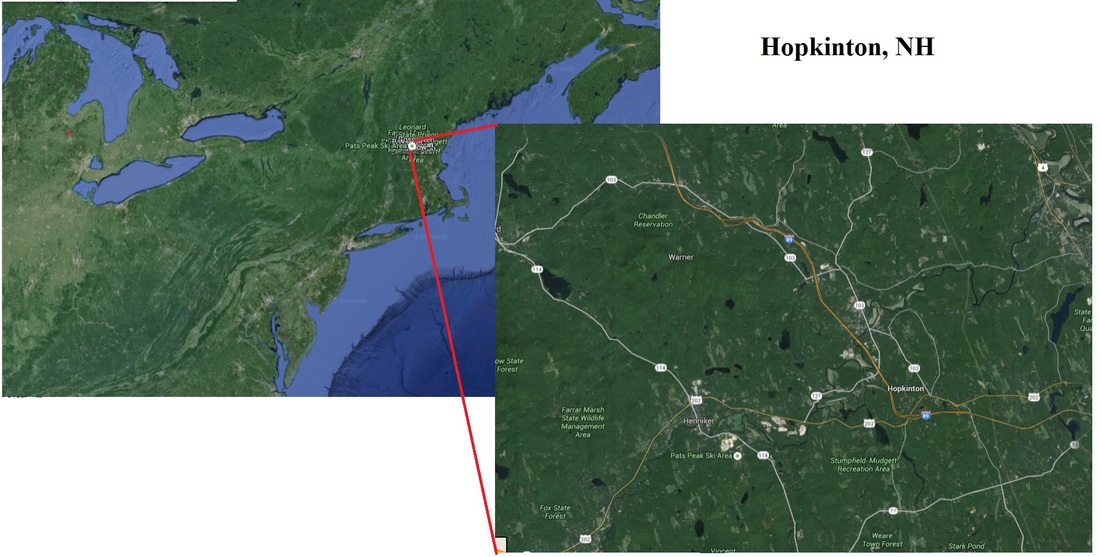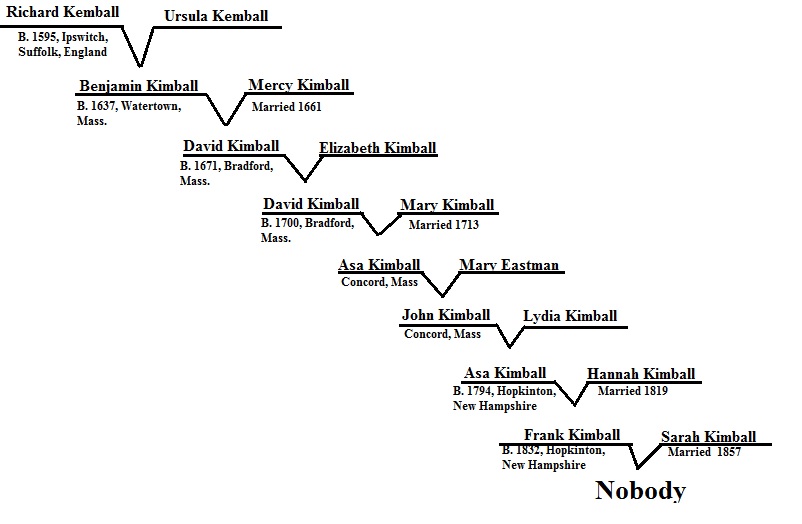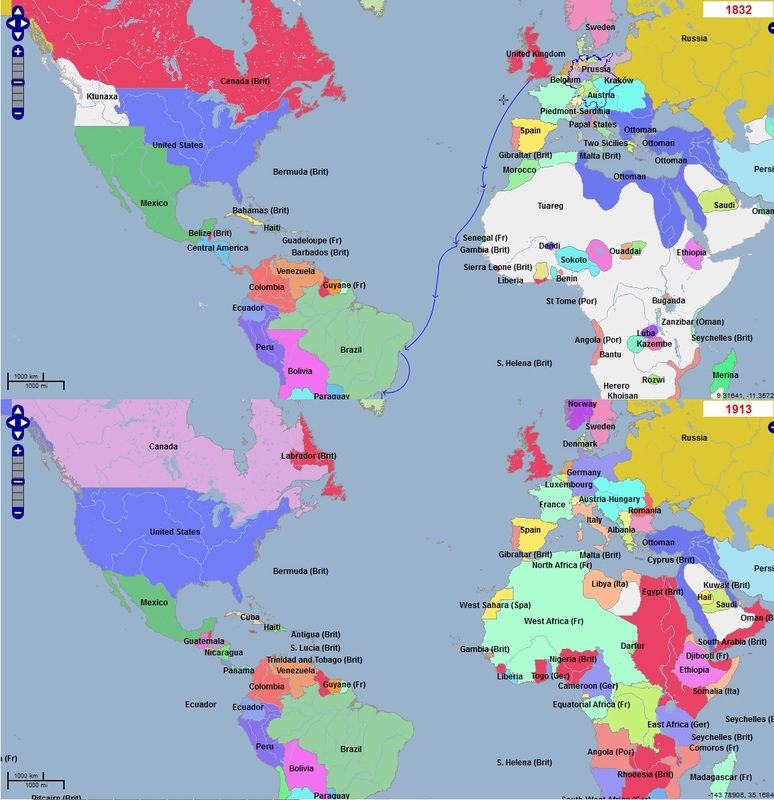Heritage & a short spectrum of Frank's time: 1832 - 1913 If you search the internet, you'll find a book called "History of the Kimball Family in America, From 1634 to 1897: and of its ancestors the Kemballs or Kemboldes of England; with an account of the Kembles of Boston Massachusetts". It was published in 1897 and is 1,370 pages thick. Digging through this book, as well as searching the internet for some of the founding documents of the towns they resided in, I was able to get a pretty good idea of the Kimball family history in America. According to various founding records, the name "Kimball" in some form or another, has been part of American history ever since the founding of the British Colonies. In April 1634, 14 years after the founding of Plymouth, a ship called the Elizabeth set sail from Ipswitch, Suffolk, England. The ship was mastered by William Andrews and carried 60 passengers; debtors looking for work, or looking to get away from the England. Among them was a 39 year old man named Richard Kemball, his wife Ursula, and their 7 children. The ship crossed the Atlantic, docked at Massachusetts Bay and the family soon found themselves in Watertown, Massachusetts where Richard worked as a wheelwright, someone who repairs wheels made of wood, and a farmer. By May of 1635, Richard had paid his debts and so became a free man. In 1637, he became a proprietor of Watertown and with Ursela, begot another son, Benjamin Kimball. It was around that time the family packed up and moved to a new settlement called Ipswich and was granted 40 acres of land. In this digital world, I have no idea what I would do with 40 acres of land, but the people of Massachusetts in the 17th century C.E., still lived in agrarian societies and much of that land was used to grow crops. Acres were set aside to build homes, churches and schools. In the colony of Massachusetts, Harvard College was established in 1636, and by the end of the century, the state would be the staging grounds for the Salem Witch Trials. Benjamin Kimball avoided all of that drama however. He was married to Mercy of Bradford, Massachusetts in 1661. A carpenter by trade, he moved to Rowley, Massachusetts in 1663. Benjamin and Mercy had 11 children, seven boys and six girls. One of their sons, David Kimball was born in 1671 in Bradford, Massachusetts. David grew up, married a women named Elizabeth, and begot another David in 1700. Twenty-five years later, that David moved about 45 miles north-west of Bradford in a place called Pennycook, and became one of the signers of a petition for a tract of land. There were a few issues though, for one thing, the land they wanted to settle was part of the colony of New Hampshire, and they were part of the Massachusetts colony, but those issues were soon settled and David Kimball became well known at the General Assembly as he was part of numerous committees in what would later become Concord, New Hampshire. David Kimball married Mary Wilson in 1730 and they had 6 children. Less then ten miles east of Concord, was another early settlement called British Township #5, though it would later become the township of Hopkinton, New Hampshire. Not long before, the name of the area had been Contoocook, named by the natives of the region who had occupied it for thousands of years before. By 1736 however, most of the natives had been pushed away from the region, and European villages began to replace them. According to its founding documents, the first treasurer of the new township was recorded as "Ebenezer Kimble". He may or may not have been related to the Kimballs of Concord, there is no evidence to say for sure. Like Watertown, Bradford, Concord and other towns before it, once the natives were cleared and the settlement was erected, the township soon began to grow, acquiring land, erecting homes and planting crops. By the early 1750s, the War of Austrian Succession was taking place in Europe. The War of Austrian Succession was a world war that happened before World War 1 over the succession of a women to the Austrian crown. She was backed by England and the Dutch, but was challenged by France and Prussia. The Americas soon become the grounds of a proxy war between the British and an alliance between the French and the Natives American tribes called King George's War (or The Seven Years War or the French and Indian War). The French started to pay the Native Americans of the region to raid English settlements and bring back captives for ransom. In fear of a raid, the township had organized garrisons to protect the townsfolk, but on the morning of April 13, 1753, Young Samuel Putney and Abraham Kimball were ambushed and taken prisoner. The Natives then forced the two boys to follow them north, but they didn't get far. A famous family of Indian hunters arrived near the town, found the group, and freed the boys. The native chief was reportedly killed when he was attacked by a dog from the group. The stories and founding documents of Hopkinton continue through its incorporation in 1765 and the Revolutionary War period. At the height of the revolution, in 1776, siding with the American cause, Hopkinton required all residents to sign a declaration of loyalty towards the united colonies. The requirement also noted that those who refused to sign would be disarmed. Every Kimball signed on. The town soon began sending men to fight in battle. Hopkinton Kimballs who fought in the American Revolution included David Kimball (A totally separate person and not to be confused with the other two David Kimballs), Moses Kimball, Reuben Kimball, and Abraham Kimball. The documents claimed that Abraham Kimball fought at Bunker Hill in 1775 and all Kimballs survived, though Abraham Kimball was listed as "severly wounded". A new Kimball joined the Hopkinton community sometime around the ratification of the Constitution; John. John Kimball was the grandson of David Kimbll, and the son of Asa Kimball and his wife Mary Eastman. A carpenter like his descendants, he began building meeting houses for the town and was soon known as "Joiner John". He and his wife, Lydia had ten kids. John decided to name his first born son after his father; Asa Kimball. The new Asa was born in 1794 and other than commanding the 40th regiment of the New Hampshire militia, he seems to have lived a quiet farm life, and who would dabble in carpentry. Marrying Hannah Little in 1819, the two had seven children: Five boys and two girls. Their fifth child, a son, was born on January 26, 1832 and was named Francis Augustus Kimball. Frank will be the focus of our story. The spectrum of Frank's life began in the mid-19th century and the first 13 years of the 20th. This was a time of constant change and turmoil in the world. China was battling an opium drug epidemic, Africa was being colonized by the English, and the new United States would spread across the North American Continent to the Pacific. The Louisiana Purchase, Texas Annexation, Mexican Cession, Gadsden Purchase, and Alaska Purchase happened during this century. Spreading the reach of the nation from sixteen states in 1800 to forty-five in 1900, the United States fought the Barbary Coast from 1801 to 1805, Britain from 1812-1815, the Barbary Coast again in 1815, Mexico from 1846 to 1848, themselves from 1861 to 1865, and Spain from 1895 to 1898, all while fighting the native populations in North American. By the turn of the century, the United States had control over the Philippines, which led to a war there from 1899 to 1902. By the end of Frank's life, San Diego would be gearing up for a world fair, the United States would be occupying Nicaragua, and helping Cuba suppress rebellions. Science and technology would advance greatly during this period as well. For one thing, the word "technology" was invented. Perfection of Steel manufacturing began to bring populations out of agrarian life and into the role of the factory worker - the Industrial Revolution had begun. The washing machine, telegraph, Levi's jeans, hot air balloons, toilet paper, electric lights, photography, sewing machines, elevator brakes, steam engines and cinema were all invented during this time. The dangerous factory conditions would bring workers to unionize for better pay and working conditions. The density of the Earth was first calculated, Darwin's theory of evolution would rock the scientific and religious worlds to its core, and speed of light was calculated. By the end of Frank's life, Charlie Chaplin would be a year away from directing his first movies, and the world had begun another war. Just like National City, the world around Frank had rapidly changed. New understandings of science led to new discoveries and technological advances, then to new markets and with that, new opportunities. The world evolved and Frank tried to evolve with it. He wouldn't say too much about national or international events, or conflicts, he was much more focused on his businesses and helping others, even to his own determent at times. It's not clear if Frank is related to the Kimballs who fought in the Revolution, or kept garrisons in the "French and Indian War". It's not even clear if he was aware of is great-grandfather, David Kimball who helped found Concord, New Hampshire. Yet, I can't help but to think that he was indeed aware of those stories, growing up in the area and all. It's possible those stories helped encourage him to make the decisions he made later in life, to leave for a new frontier and to make new opportunities for himself, to leave a small mark in his lifetime and to help others, and in that, he would hope to find satisfaction... ...but that's just speculation.
1 Comment
Mark
10/13/2021 05:27:38 am
I share the same ancestors as Frank. I still live in the Concord/Hopkinton Nh area. We are the Kimball's that have never left this area. As to the ending of your story, I am quite sure Frank new of his ancestors here. The Kimball family was/is quite strong in knowing our family connections in this area.
Reply
Leave a Reply. |
Archives
March 2024
|




 RSS Feed
RSS Feed